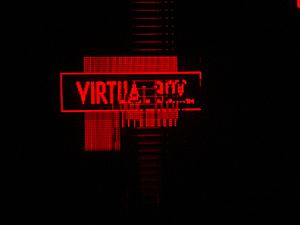Glitch facts for kids
A glitch is a small, short-lived problem in a system. It's like a tiny hiccup that often fixes itself quickly. This word is often used when talking about computing devices, electronics, and video games. Even things like speech can have glitches.
A glitch is usually minor and temporary. It's different from a more serious bug. A bug is a real breakdown that needs fixing. Think of it this way: a bug is a big problem you can find and fix. A glitch is a quick, unexpected issue that might be hard to figure out. It often happens because of something unusual or outside the normal rules.
Contents
What Does the Word "Glitch" Mean?
The word "glitch" comes from German and Yiddish words. These words mean "to slip" or "to slide." In the 1940s, radio announcers started using "glitch." They used it to describe a mistake made while on the air.
How "Glitch" Became Popular
The word "glitch" was first seen in writing on May 19, 1940. A writer named Katharine Brush used it in her newspaper column. She wrote that radio talkers called a small mistake a "fluff." A bigger mistake was called a "glitch." Other examples from radio in the 1940s also used the term. For instance, a book about radio broadcasting mentioned "muff," "fluff," "bust," or "glitch" for errors.
In the 1950s, "glitch" moved from radio to television. An ad in 1953 talked about TV cameras having "no more a-c power line 'glitches'." This meant no more horizontal lines on the screen. Another ad in 1955 explained that a "glitch" was a low-frequency problem. It looked like a narrow horizontal bar moving through the picture.
By 1959, "glitch" was used for editing TV commercials. It meant a "momentary jiggle" at the editing point. This happened if the timing signals didn't match perfectly.
Glitch in the Space Race
The word "glitch" became widely known in 1965. Astronaut John Glenn explained it in his book Into Orbit. He said a glitch was a sudden change in electrical voltage. This happens when a circuit gets a new load. You might see lights dim when you turn on a dryer. Fuses protect against big changes. But a glitch is such a tiny change that fuses can't stop it.
Another person, John Daly, also defined it on a TV show. He said it was a term used by the Air Force at Cape Kennedy. When something went wrong with rockets and they couldn't figure out why, they called it a "glitch." Soon after, Time magazine defined it as "a spaceman's word for irritating disturbances." Many people believe the term became common during the American Space Race of the 1950s. It described small problems in rocket parts that were hard to find.
Sometimes, people jokingly say "glitch" means "gremlins lurking in the computer hardware."
Types of Glitches
Glitches can happen in many different systems. They are often brief and unexpected.
Electronics Glitches
An electronics glitch is a quick change in an electrical signal. This often happens in digital circuits. It can be caused by signals racing each other with different delays. Sometimes, a glitch is harmless and normal. Other times, it can cause a device to malfunction. Some electronic parts need a pulse of a certain length to work. A pulse that is too short might be called a glitch.
Computer Glitches
A computer glitch is when a computer system doesn't work right. It might not finish its tasks or do them correctly. Often, these errors aren't noticed right away. They show up later as wrong data or bad decisions.
Things often called computer glitches include:
- Mistakes in software (software bugs).
- Wrong instructions given by the user.
- Bad information put into the system that isn't caught.
- Errors in communication between devices.
- Computer viruses or Trojan attacks.
- Computer exploiting (sometimes called "hacking").
These glitches can cause problems like keyboards not working. Or numbers on the keypad failing. Screens might look strange, like being upside down. Programs might crash randomly.
For example, in 2010, a water filtration plant shut down unexpectedly because of a computer glitch. In Austin, police 911 calls went unanswered due to a glitch in their dispatch system. A tiny error in the Cassini spacecraft made it go into "safe mode" in 2010. Glitches can also be very expensive. In 2015, a bank lost over a million dollars a day for weeks because of a glitch.
Video Game Glitches

Glitches in video games can show up in many ways. This includes graphics and sound errors. There can be problems with objects passing through walls. Games might crash, or other issues can happen. Game developers have testers who look for glitches. They report them so programmers can fix them. If not enough fixes are made, many glitches can end up in the final game.
Some players enjoy trying to make glitches happen in games. They might do things like tilting a game cartridge. This can mess up the data flow.
"Glitch hunters" are game fans who look for helpful glitches. These glitches can help them speedrun a game faster. This might involve skipping parts of a level or beating enemies quickly. The Souls games have many glitch hunters. Using glitches in speedruns can be a debated topic. Some people think it goes against what the game makers intended. Others believe using glitches takes a lot of skill. There are different types of speedruns. "Any%" runs allow any glitches. "Glitchless" runs mean no glitches were used.
Some games even include fake glitches on purpose. This can be to scare the player or make them feel uneasy. It can also be part of the game's story. Games like Eternal Darkness and Batman: Arkham Asylum have parts that look like your game system is failing. The Animus in the Assassin's Creed series shows occasional glitches. This helps the player feel like they are using a computer system to see memories.
Television Glitches
In TV broadcasting, a bad signal can cause glitches. These might look like jagged lines or misplaced squares on the screen. You might see static, freezing pictures, or strange colors. Glitches can affect the video, the sound, or the way the signal is sent. These problems can be caused by many things. This includes interference from phones or microwaves. Damaged cables at the TV station or bad weather can also cause glitches.
See also
 In Spanish: Glitch para niños
In Spanish: Glitch para niños
- Fuzzing
- Glitch art
- Glitch removal
- Hazard (logic)
- Hardware bug
- Software bug
 | Aaron Henry |
 | T. R. M. Howard |
 | Jesse Jackson |


